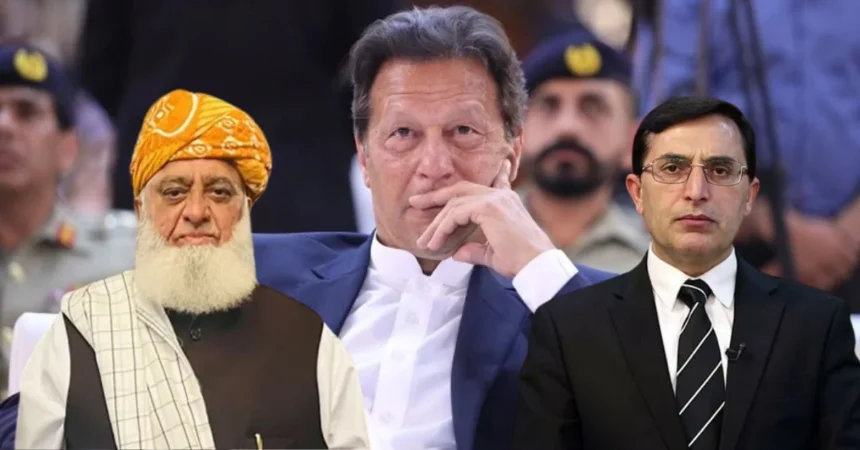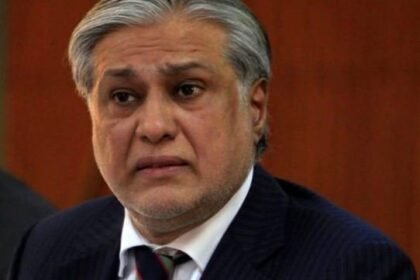In recent developments, Imran Khan, the former Prime Minister of Pakistan and leader of the Pakistan Tehreek-e-Insaf (PTI) party, has urged his party members to maintain open lines of communication with Maulana Fazlur Rehman, the leader of the Jamiat Ulema-e-Islam (JUI-F). This directive comes in light of ongoing discussions surrounding a proposed judicial package aimed at reforming the country’s legal framework. Khan’s call for collaboration emphasizes the importance of bipartisan efforts in addressing pressing judicial matters that affect the nation’s governance and democratic processes.
The Context of the Judicial Package
The judicial package is a set of proposed reforms intended to enhance the efficiency and transparency of Pakistan’s judicial system. This initiative has gained traction amid widespread concerns over the slow pace of justice delivery, backlogged cases, and perceptions of political interference within the judiciary. The government, alongside various political stakeholders, recognizes that a robust and independent judiciary is vital for upholding the rule of law and fostering public trust in legal institutions.
The judicial package in Pakistan seeks to address long-standing issues within the country’s legal framework, emphasizing reforms that promote efficiency, transparency, and accountability. One of the critical aspects of the proposed reforms is the introduction of measures to reduce the backlog of cases, which has plagued the judiciary for years. With millions of cases pending in courts, timely justice remains elusive for many citizens, eroding their faith in the legal system. By streamlining processes and increasing the number of judges, the government aims to expedite hearings and rulings, ensuring that justice is not only done but seen to be done.
Additionally, the package proposes enhancements to the existing infrastructure of the judicial system, including the digitization of records and the implementation of e-filing systems. These technological advancements are designed to minimize paperwork, reduce the likelihood of lost documents, and facilitate easier access to case information for both legal professionals and the general public. Such measures are essential in a country where many citizens struggle to navigate the complexities of the legal system. By making legal processes more accessible, the government hopes to empower individuals and encourage greater engagement with the judiciary.
Another focal point of the judicial package is the establishment of independent oversight bodies to monitor the functioning of the courts and to investigate complaints against judges. This move is intended to bolster public confidence in the judiciary by ensuring that allegations of misconduct or bias are addressed transparently and fairly. It also aims to mitigate political interference, which has often undermined the credibility of judicial decisions in Pakistan. Establishing an independent mechanism for accountability is crucial for nurturing an environment where judicial officers can operate free from external pressures.
Furthermore, the package aims to enhance the training and capacity-building of judicial staff and lawyers. Ensuring that legal practitioners are well-versed in contemporary legal practices and equipped with the necessary skills to handle complex cases is vital for improving the overall quality of legal representation in the country. Continued professional development opportunities for judges and legal professionals will not only enhance their expertise but also contribute to more informed and fair judicial outcomes.
Lastly, bipartisan collaboration is deemed essential for the success of the judicial package. Political consensus on such reforms is necessary to create a stable framework that can withstand changes in government and public opinion. By engaging in dialogue with various political parties, including those traditionally opposed to each other, the government can build a more robust and inclusive reform agenda. This collaborative approach may help address the entrenched divisions in Pakistani politics and foster a shared commitment to judicial integrity and public trust.
PTI’s Role in the Reform Process
As one of the key political players in Pakistan, PTI’s involvement in the judicial reform discussions is crucial. The party has a history of advocating for judicial independence and accountability. Imran Khan’s leadership and directives signal PTI’s commitment to engaging constructively with other political factions to bring about meaningful reforms. By working with Fazlur Rehman and the JUI-F, PTI aims to bridge political divides and cultivate a cooperative environment conducive to legislative progress.
PTI’s active participation in the judicial reform process underscores its strategic approach to governance and political engagement in Pakistan. Historically, PTI has positioned itself as a proponent of judicial independence, emphasizing the need for a transparent legal system free from political manipulation. Imran Khan’s efforts to rally support from various political factions, including JUI-F under Fazlur Rehman, indicate a pragmatic shift towards collaborative politics. This cooperation is particularly significant given the longstanding political rivalries that have often hindered effective governance and reform initiatives in the country.
By aligning with JUI-F, PTI not only strengthens its reform agenda but also showcases its willingness to engage in bipartisanship, a critical factor for the success of any legislative effort. This partnership can help cultivate a sense of shared responsibility among political leaders, which is essential for fostering a more inclusive dialogue on judicial reforms. Such collaboration could also pave the way for broader support from civil society and the public, who have long called for accountability and integrity within the judicial system. As both parties work together, they may find common ground on various issues, facilitating the development of a comprehensive judicial reform package that addresses the concerns of diverse stakeholders.
Moreover, PTI’s involvement in this reform process may enhance its political capital in the eyes of the electorate. By championing judicial reforms, PTI can position itself as a party committed to justice and the rule of law, which resonates with the aspirations of many Pakistanis for a fair and efficient legal system. The success of these reforms could serve as a significant legacy for Imran Khan, bolstering PTI’s image as a transformative force in Pakistani politics. As the party navigates this complex landscape, its engagement with JUI-F and other political entities will be critical in shaping the future of Pakistan’s judiciary and the public’s trust in its legal institutions.
Importance of Bipartisan Collaboration
Bipartisan collaboration is essential for the successful passage of any judicial reforms. Historically, significant changes in Pakistan’s legal framework have often resulted from consensus among major political parties. Imran Khan’s directive reflects an understanding that achieving lasting reforms requires cooperation rather than contention. Engaging with leaders like Fazlur Rehman, who may have differing political views, allows for a more comprehensive approach that considers various perspectives and interests within the political spectrum.
Challenges in the Reform Process
Despite the positive intent behind the collaborative approach, several challenges may impede the reform process. Political rivalries and mistrust among parties can create hurdles in negotiations. Additionally, entrenched interests within the judicial system may resist changes that threaten their authority or operational dynamics. Addressing these challenges will require patience, strategic diplomacy, and a commitment to prioritizing the national interest over partisan agendas.
Stakeholder Reactions and Public Sentiment
The response to Khan’s directive has been mixed. While some political analysts praise the move as a step towards constructive dialogue, others express skepticism regarding the sincerity of the parties involved. Public sentiment regarding judicial reforms is high, with citizens increasingly demanding accountability and efficiency from their legal institutions. This pressure from the electorate adds an additional layer of urgency to the discussions, as political parties must be mindful of public expectations in their reform efforts.
The Role of Civil Society and Legal Experts
Civil society organizations and legal experts play a pivotal role in shaping the discourse around judicial reforms. Their insights can help identify key areas of improvement and propose evidence-based solutions. As PTI and JUI-F engage in consultations, it is imperative that they consider the recommendations from these stakeholders to ensure that the reforms address the real issues plaguing the judicial system. This inclusive approach can enhance the legitimacy of the proposed changes and foster broader public support.
Next Steps for PTI and JUI-F
As consultations between PTI and JUI-F continue, the next steps will involve drafting a comprehensive reform proposal that outlines specific changes to be made within the judicial framework. This proposal will need to be carefully crafted, considering the complexities of the existing legal system and the diverse interests of various political and social actors. Once a draft is prepared, it will likely undergo further discussions, revisions, and negotiations before being presented to the legislative assembly for consideration.
The Path Forward
In conclusion, Imran Khan’s directive for PTI to engage with Fazlur Rehman on the judicial package represents a significant moment in Pakistan’s political landscape. The successful implementation of judicial reforms hinges on the ability of political leaders to set aside differences and work collaboratively towards common goals. As discussions progress, the eyes of the nation will be on these leaders to see if they can translate dialogue into actionable reforms that will ultimately benefit the citizens of Pakistan.
#ImranKhan #JudicialReforms #PakistanPolitics #PTI #JUIF #BipartisanCollaboration #RuleOfLaw







